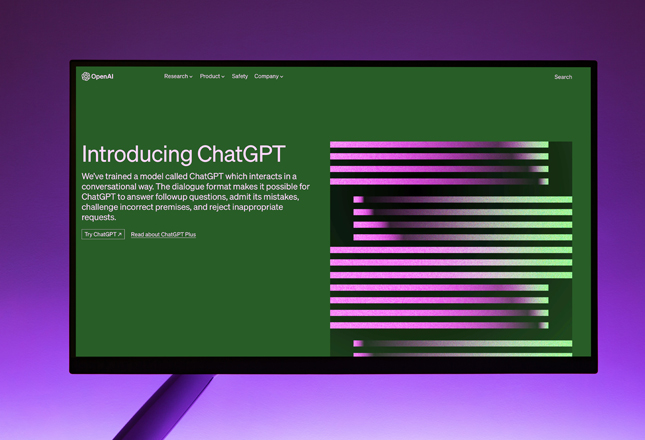ChatGPT Could Improve Efficiency In CRE Management, If You Use It Right
Reading Time : 6 minutes
When ChatGPT was launched, it showed commercial real estate the potential power of artificial intelligence. However, AI had already been creeping into technology for several years, global proptech firm Retransform’s Associate Vice President of Technology and Innovation Kaushlesh Chandel said. And while the hype around ChatGPT will eventually quieten, it is currently changing how commercial properties are managed.
“When OpenAI launched ChatGPT to the public, the company successfully democratized AI to allow even smaller companies to use it,” he said. “The result is that today people believe more in the power of AI technologies than just a few years ago. No doubt companies that implement AI successfully will benefit, but they do need to be mindful of potential pitfalls.”
Use cases for ChatGPT in the management of commercial real estate currently focus on the tool’s ability to recall and provide information much more quickly than a human could, Chandel said. This could benefit both residents and property managers alike.
Externally, companies are using ChatGPT to create accurate chatbots. A potential resident could ask a chatbot whether any two-bed apartments are available, on what terms, or even what amenities a building has. Although chatbots existed before, ChatGPT provides a quicker solution, Chandel said.
“The big difference between what is possible now and pre-ChatGPT was that although solutions such as Amazon’s Alexa existed, it took a lot of effort to train it with accurate data,” Chandel said. “But with GPT you just have to train it with information and it automatically knows what to answer.”
Internally, property managers could use ChatGPT to quickly answer questions such as how much rent a particular tenant has paid over the last five years, or how much energy a property has consumed.
“It's like an elephant that never forgets,” Chandel said. “You give it the data, whether it is one year, two years or 10 years of data, and it will give an answer very quickly. Even with the best analytics system, it would take maybe 20 minutes to check how much Walgreens paid in average rent in 2018.”
ChatGPT isn’t the only form of AI that property managers are using, Chandel said. While ChatGPT is a form of generative AI, other forms of AI are being used for purposes such as machine learning to detect anomalies. A user can train AI on historical data, such as about property expenses or invoices, and the AI can then detect anomalies in future transactions.
Retransform has already implemented AI to carry out these types of functions in its core solutions. The company is continually innovating in the use of AI in three particular areas, Chandel said.
First, it is looking into how the company can give more to its customers in terms of knowledge and efficiency. Second, Retransform is exploring how solutions can provide more for investors, such as increased returns. Finally, the company is using AI to improve the day-to-day activities of people managing a property, such as by giving predictive and diagnostics information.
“AI can automatically find an anomaly, such as energy consumption that is higher than normal, while a human has to manually look for them,” Chandel said. “The AI will constantly scan information, which means that a property manager can be far more proactive.”
Chandel said that companies that embrace AI will be ahead of the game. It will increase efficiency and speed significantly, helping organizations to generate better returns and reduce the risk of human error. Larger organizations are already investing in creating solutions, setting a good example of how to use it most effectively. This will trickle down to smaller companies rapidly.
However, there are challenges to using ChatGPT and other forms of AI, Chandel said.
“Immature or premature implementation of this kind of technology can lead to disaster,” he said. “We have to understand where it should and shouldn’t be applied.”
He cited an example of an AI tool being used to automatically draft an email response to a query. An issue could arise if the technology also sends the response, without a human having edited or checked the content.
Another example of where AI can go wrong is called an ‘AI hallucination’. This is when the technology produces a response even if it doesn’t know the answer, because it hasn’t been set a boundary such as ‘Don’t give a response if the answer isn’t clear’. This can be dangerous when a person requests critical information, Chandel said.
“A final challenge could be liability,” he said. “If you use an AI solution to fetch critical information that is then shared with the outside world, who is liable? The liability should remain with the person using the solution, but this isn’t automatically clear.”
Despite remaining unanswered questions, the rush to find a good use for tools such as ChatGPT is likely to follow Gartner’s hype cycle, Chandel said. After the hype will come disillusionment in the technology, and only then will productivity follow.
“At the moment, too many people are trying too much,” he said. “But the Gartner hype cycle will be much shorter than for any other technology we have seen in the past because of awareness — people know what it is — and availability. So will AI change the world? I strongly believe it will. But not as quickly as people think.”
This article was produced in collaboration between Retransform and Studio B. Bisnow news staff was not involved in the production of this content.

